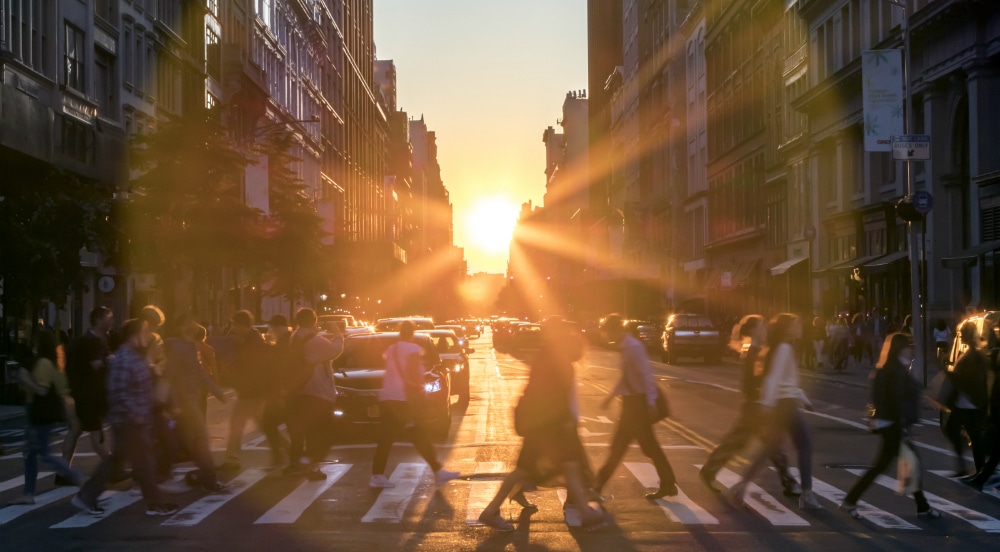Cities: a Common Front Against Climate Change and in Post-pandemic Recovery

When former U.S. President Donald Trump announced his withdrawal from the Paris Agreement in 2019, 61 U.S. mayors joined in opposition to the government and signed a declaration of commitment to the Agreement’s goals. This act set a powerful example for cities around the world to become aware of their potential for change. It testifies to the role that cities are acquiring in the international landscape. After all, although they cover only about 2% of the planet, since 2007 they have been home to more than 50% of the global population, with the prospect estimated by the World Bank of reaching 70% in 2070. Cities are also powerful economic agents, accounting for 80% of the world’s GDP, and also produce most greenhouse gas emissions, covering about 75% of the total. According to many scholars, the 21st century is witnessing the loss of political weight of the state and the rise of the city as an entity of international importance. On the other hand, cities have always been protagonists on the international scene, and many define the Westphalian world as a brief phase of the importance of states in a history characterized by the role of local entities.
Climate change has now conquered the global media scene, also because of the increasingly frequent natural disasters it induces. As unfortunately witnessed by this summer’s extreme events, climate change is no longer a distant prospect, estimated only by the scientific community, but a tangible reality. This leads the various global institutions to seek mitigation and adaptation strategies. In this context, a central role is played by cities.
When former U.S. President Donald Trump announced his withdrawal from the Paris Agreement in 2019, 61 U.S. mayors joined in opposition to the government and signed a declaration of commitment to the Agreement’s goals [1]. This act set a powerful example for cities around the world to become aware of their potential for change. It testifies to the role that cities are acquiring in the international landscape. After all, although they cover only about 2% of the planet, since 2007 they have been home to more than 50% of the global population, with the prospect estimated by the World Bank of reaching 70% in 2070. Cities are also powerful economic agents, accounting for 80% of the world’s GDP, and also produce most greenhouse gas emissions, covering about 75% of the total [2]. According to many scholars, the 21st century is witnessing the loss of political weight of the state and the rise of the city as an entity of international importance. On the other hand, cities have always been protagonists on the international scene, and many define the Westphalian world as a brief phase of the importance of states in a history characterized by the role of local entities [3].
To ensure greater effectiveness in their international action, cities have, over time, formed networks, i.e., associations of local governments to share knowledge, collaborate with public and private actors and defend collective urban interests. More than 200 formal networks are currently in place, with four new ones growing each year. Networks focused on environmental issues account for nearly one-third of the total. Major ones include UCLG, C40 and ICLEI.
Another important network of cities is Urban 20 (U20), a parallel mechanism to the Group of 20 that works to provide recommendations to national leaders to implement urban policies that are fair, sustainable and cost-effective. In the year of Italy’s G20 presidency, U20 met in Rome in September under the co-chairmanship of the cities of Rome and Milan to discuss appropriate urban policies to achieve climate neutrality by 2050 and to ensure a recovery from the COVID-19 pandemic that is both equitable and sustainable.
The pandemic has caused millions of deaths and displaced people around the world. What began as a health crisis quickly turned into a human and socioeconomic crisis. At the same time, the world has entered the “decade of action,” which requires accelerating sustainable solutions to major global problems, ranging from inequality to climate change. Being able to reduce global emissions by 50% means, according to UN Secretary-General Antonio Guterres, mobilizing all sectors of society for a decade on three levels: global action, ensuring smarter leadership, resources, and solutions to achieve the SDGs; local action, integrating the necessary transitions into the legal frameworks, policies, budgets, and institutions of cities and local governments; and citizen action, which includes civil society, trade unions, the media, academia, and the younger generation, which are especially needed to spark a global movement that pushes for sustainable transformation [4].
In this context, the G20 countries are better equipped to deal with the health crisis because of their vast economic resources. However, since they are also the main producers of carbon emissions, they have a responsibility to be at the forefront of the fight against climate change. And this according to the principle of “common but differentiated responsibilities”, the seventh of the Declaration on Environment and Development launched at the Earth Summit in Rio de Janeiro in 1992 and among the fundamental principles of the Framework Convention on Climate Change, approved at the same international conference. In the aftermath of the pandemic and in the year of COP26, G20 national governments announced that they would cumulatively pour $13 billion in fiscal support, stimulus packages and recovery plans, which should be spent wisely and sustainably to significantly reduce GHG emissions, create job opportunities and increase resilience.
Well, despite the proclamations, only 7% of COVID-19 incentive packages are explicitly dedicated to green projects. Instead, the U20 mayors are proposing the full use of funds to contribute to the goals of the Paris Agreement. This includes, in particular, an end to fossil fuel incentives and increased investment in green areas in cities, public transportation, and sustainable food systems. In addition, G20 countries should support developing countries to ensure a global and equitable green transition.
Another top priority of all recovery plans is job creation. Mayors suggest that a green and just recovery has the potential to create up to 50 million jobs by the end of 2025 in C40 cities. Equal employment opportunity, support for increasing women’s participation in the workforce, and regulation of informal work in key sectors are essential aspects of a fair and just transition.
Finally, recovery must be local. Although cities are home to the majority of the population of G20 countries and have been the hardest hit by the pandemic, they have not been adequately involved in developing recovery plans and the majority will not directly benefit. The co-chairs of the U20 2021 Summit are calling on G20 leaders to ensure that cities receive stimulus packages and that national recovery plans include at least 30 percent urban projects. They argue that cities already have ambitious climate action plans and should be supported in introducing recovery measures at the local level in order to build back better and become essential allies of nations in achieving climate goals [5].
The plans outlined by the U20 group of mayors are forward-looking, ambitious, and require a high level of cooperation among cities to achieve the goals that will lead to climate neutrality in 2050. Mayors are doing great work in persuading national leaders, and it is often because of them that more just and sustainable policies are being put in place. If every local entity worked towards the best possible stewardship of their land, achieving the SDG goals and the promise of a more sustainable world would easily become a reality: think global, act local.
References
[1] Climate Mayors (2019) Statement From The Climate Mayors in Response to President Trump’s Withdrawal From the Paris Climate Agreement. Statement originally released on 1 June 2017 with 61 signatories. Updated signatories on 27 November 2019. Text available at https://climatemayors.org/actions-paris-climate-agreement/
[2] World Bank, (2020) Urban Development. Last Updated 20 April 2020. Available athttps://www.worldbank.org/en/topic/urbandevelopment/overview
[3] Marchetti, R. (2021) ‘City Diplomacy. A New Chance for the Italian G20 Presidency.’ Published 16 April 2021. Rome: Luiss Open. Available athttps://open.luiss.it/en/2021/04/16/city-diplomacy-a-new-chance-for-the-italian-g20-presidency/
[4] United Nations (2020) Decade of Action. Sustainable Development Goals. New York: UN. Available at https://www.un.org/sustainabledevelopment/decade-of-action/
[5] Urban 20 (2021) Rome-Milan Communiqué. Issued in the context of the Urban 20 Mayors Summit in Rome. Rome: U20.

